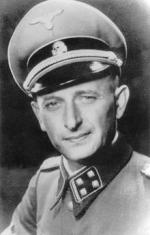Disable ads!
Adolf Eichmann
Otto Adolf Eichmann (pronounced [ˈɔto ˈaːdɔlf ˈaɪ çman]; 19 March 1906 – 1 June 1962) was a German Nazi SS-Obersturmbannführer (lieutenant colonel) and one of the major organisers of the Holocaust. Eichmann was charged by SS-Obergruppenführer Reinhard Heydrich with facilitating and managing the logistics of mass deportation of Jews to ghettos and extermination camps in German-occupied Eastern Europe during World War II. In 1960, he was captured in Argentina by the Mossad, Israel's intelligence service. Following a widely publicised trial in Israel, he was found guilty of war crimes and hanged in 1962. After an unremarkable school career, Eichmann briefly worked for his father's mining company in Austria, where the family had moved in 1914. He worked as a travelling oil salesman beginning in 1927 and joined the Nazi Party and SS in 1932. After returning to Germany in 1933, he joined the Sicherheitsdienst (SD; Security Service), where he was appointed head of the department responsible for Jewish affairs—especially emigration, which the Nazis encouraged through violence and economic pressure. After the outbreak of World War II in September 1939, Eichmann and his staff arranged for Jews to be concentrated into ghettos in major cities with the expectation they would be transported farther east or overseas. Eichmann drew up plans for a Jewish reservation, first at Nisko in south-east Poland and later in Madagascar, but neither of these plans was ever carried out. As the Nazis began the invasion of the Soviet Union in 1941, their Jewish policy changed from emigration to extermination. To co-ordinate planning for the genocide, Heydrich hosted the regime's administrative leaders at the Wannsee Conference on 20 January 1942. Eichmann collected information for Heydrich, attended the conference, and prepared the minutes. Eichmann and his staff became responsible for Jewish deportations to extermination camps, where the victims were gassed. After Germany invaded Hungary in March 1944, Eichmann oversaw the deportation and extermination of that country's Jewish population. Most of the victims were sent to Auschwitz concentration camp, where 75 to 90 per cent were killed on arrival. By the time the transports were stopped in July, 437,000 of Hungary's 725,000 Jews had been killed. Historian Richard J. Evans estimates that between 5.5 and 6 million Jews were exterminated by the Nazis. Eichmann said towards the end of the war that he would "leap laughing into the grave because the feeling that he had five million people on his conscience would be for him a source of extraordinary satisfaction." After Germany's defeat in 1945, Eichmann fled to Austria. He lived there until 1950, when he moved to Argentina using false papers. Information collected by the Mossad, Israel's intelligence agency, confirmed Eichmann's location in 1960. A team of Mossad and Shin Bet agents captured Eichmann and brought him to Israel to stand trial on 15 criminal charges, including war crimes, crimes against humanity and crimes against the Jewish people. Found guilty on many of these charges, he was sentenced to death by hanging and executed on 31 May 1962. The trial was widely followed in the media and was later the subject of several books, including Hannah Arendt's work Eichmann in Jerusalem, in which Arendt coined the phrase "the banality of evil" to describe Eichmann.
 Read more on wikipedia.org Read more on wikipedia.org
 All quotes by Adolf Eichmann All quotes by Adolf Eichmann
 Edit Edit
|

|
|
|
|
|
Background photo by Giuliana
|